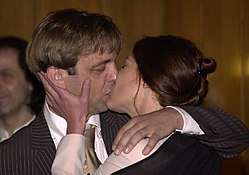buča
Latvian

Buča
Etymology
From Proto-Baltic *bu- (with an extra onomatopoeic č(a), suggesting the sound of kissing), from Proto-Indo-European *bu- (“lip”). Some researchers suggest borrowing from Germanic; the majority opinion is that this word was not borrowed. Cognates include Lithuanian bùčius, bučinỹs, Belarusian бу́ся (búsja), Bulgarian бу́зя (búzja, “cheek”), Polish buzia (“mouth; face; kiss”), Ukrainian бу́зя (búzja, “mouth”), Middle Low German bützen, German bussen (“to kiss”) (dialectal pussen), Swedish puss (“kiss”), Irish bus (“lip”), Albanian buzë (“lip”), Latin bucca (“mouth”).[1]
Pronunciation
- IPA(key): [butʃa]
Audio (file)
Noun
buča f (4th declension)
- (colloquial) kiss (a touch with the lips, to express love, friendship, respect, devotion)
- viņš deva tai sirsnīgu buču ― he gave her a warmhearted kiss
- kad meita buču saņēmusi, tad viņa iesaucas: “tu pagāns!” un dara tā, it kā tā lūpas gribētu noslaucīt ― when the girl received the kiss, she exclaimed: “you heathen!” and did as if she wanted to wipe her lips clean
- Synonym: skūpsts
Declension
Declension of buča (4th declension)
Related terms
References
- Karulis, Konstantīns (1992), “buča”, in Latviešu Etimoloģijas Vārdnīca (in Latvian), Rīga: AVOTS, →ISBN
Serbo-Croatian
Pronunciation
- IPA(key): /bût͡ʃa/
- Hyphenation: bu‧ča
Slovene
Pronunciation
- IPA(key): /bùːt͡ʃa/
This article is issued from
Wiktionary.
The text is licensed under Creative
Commons - Attribution - Sharealike.
Additional terms may apply for the media files.